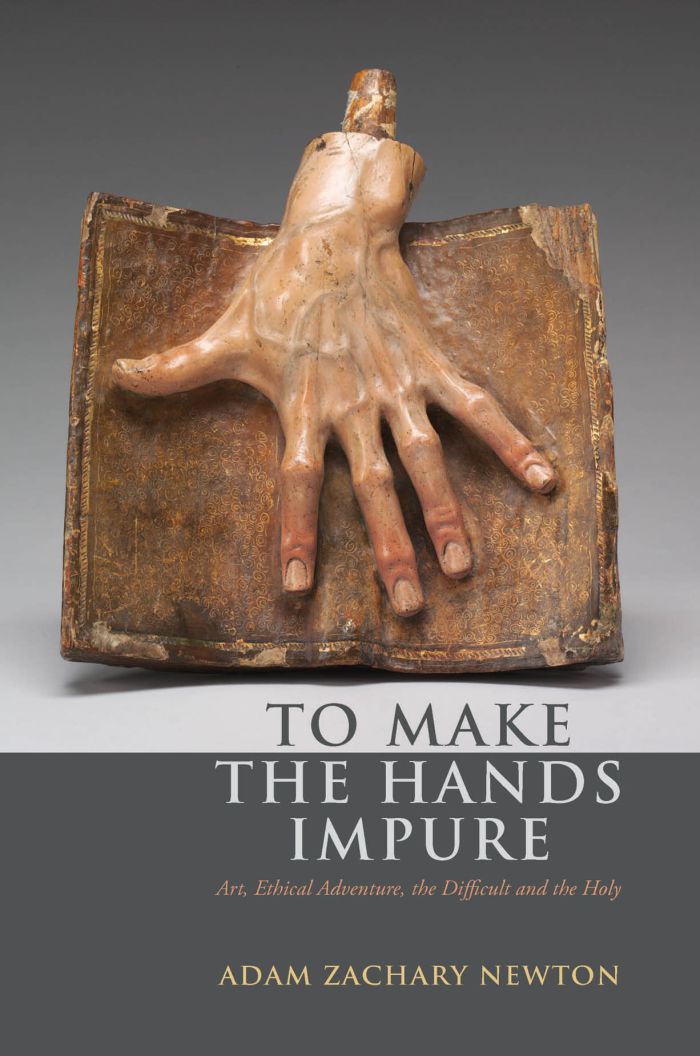To Make the Hands Impure
Art, Ethical Adventure, the Difficult and the Holy

This book can be opened with

How can cradling, handling, or rubbing a text be said, ethically, to have made something happen? What, as readers or interpreters, may come off in our hands in as we maculate or mark the books we read?
For Adam Zachary Newton, reading is anembodied practice wherein “ethics” becomes a matter of tact—in the doubled sense of touch and regard. With the image of the book lying in the hands of its readers as insistent refrain, To Make the Hands Impure cuts a provocative cross-disciplinary swath through classical Jewish texts, modern Jewish philosophy, film and performance, literature, translation, and the material text.
Newton explores the ethics of reading through a range of texts, from the Talmud and Midrash to Conrad’s Nostromo and Pascal’s Le Mémorial, from works by Henry Darger and Martin Scorsese to the National September 11 Memorial and a synagogue in Havana, Cuba. In separate chapters, he conducts masterly treatments of Emmanuel Levinas, Mikhail Bakhtin, and Stanley Cavell by emphasizing their performances as readers—a trebled orientation to Talmud, novel, and theater/film. To Make the Hands Impure stages the encounter of literary experience and scriptural traditions—the difficult and the holy—through an ambitious, singular, and innovative approach marked in equal measure by erudition and imaginative daring.
“To Make the Hands Impure brings together Newton’s impressive and successful academic/scholarly writing career. But it does not do so in a way that merely repeats and organizes what he has already done. The book is new and expansive and shows that Newton has not stopped rethinking the questions that have engaged him throughout his career.”
“This is criticism as literature, literature as anthropology, anthropology as ethics. Ambitious and generous, it is a profoundly creative step in the renewal and integration of Jewish and critical discourses.”
Adam Zachary Newton’s incisive insights into 'holding the book in hand' shed light on the esthetic and ethical implications encapsulated in the act of reading. Based on a broad spectrum of disciplines and sources--Emmanuel Levinas’ Talmudic Readings, literary criticism (Edward Said, Mikhail Bakthin, Roland Barthes…), Analytical philosophy (Stanley Cavell), Medieval Jewish and Arabic philosophy (Ibn Hazm, Ibn Ezra…) to cite but a few--his 'ethics of reading' is an invitation to reconsider the interplay between the hand and the text not as grasping or appropriating but rather as 'proximity'; i.e. as a situation where 'one is drawn out of oneself, toward the elsewhere, toward the other.'
“In its important achievement, this book offers a profound rethinking of the postmodern meanings of Jewish tradition. Adam Zachary Newton’s privileged tropes of the tactile also stand for his ‘tact’ of reading as secular midrash. His ethics of reading shows us that the boundaries separating Jewish and other texts ultimately connect the foreign with the native, the distant with the near, without collapsing the two, through an impurity inseparable from the revelation of the other. The utter originality of this book thus consists of its conception of impurity as the redemptive effect of the sacred and its prescient reassertion of Jewish sources in postmodern critical form.”
“Newton’s new book, a tapestry of readings that becomes a contrapuntal symphony, heuristically suggests it is no longer the case that reading the Bible is the same as reading any other piece of literature, as Spinoza suggested, but rather that reading any piece of literature is like reading the Bible, if one reads it the way rabbis do.”

